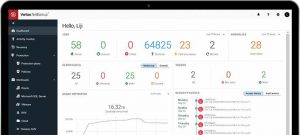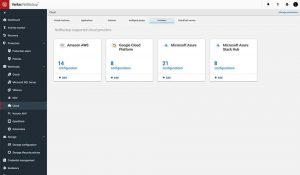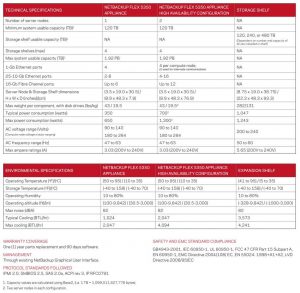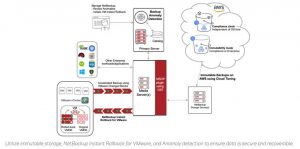Veritas Updates Enterprise Data Services Platform to Extend Ransomware Protection for Kubernetes and Cloud Environments
And launches NetBackup Flex 5350 appliance.
This is a Press Release edited by StorageNewsletter.com on June 23, 2021 at 2:32 pmVeritas Technologies announced updates to its Enterprise Data Services platform to extend ransomware protection to every part of the enterprise.
The company’s NetBackup solution provides a backup solution available on the market to delivering ransomware protection for containerized environments, immutability for Amazon S3, and integrated anomaly detection. Further enhancements include the launch of the NetBackup Flex 5350 appliance, which offers data immutability, doubles the performance of its closest competitor, and completes the upgraded company’s family of ransomware-hardened data protection appliances.
Doug Matthews, VP, product management, said: “With the increase in ransomware attacks targeting mission critical infrastructure like oil & gas, healthcare, telecommunications and beef and dairy, our newest NetBackup release represents a significant advancement in Veritas’ leadership of backup and recovery solutions by further protecting customers vs. increasingly prevalent ransomware attacks, irrespective of where their data resides: cloud, containers or on-premises.“
NetBackup delivers more resiliency vs. ransomware
-
Integrated AI/ML anomaly detection: The company is folding AI and ML-driven anomaly detection into NetBackup as an inclusive feature to alert backup admins of potential issues and ensure data is always recoverable.
-
Ransomware-hardened appliance: NetBackup Flex release delivers a ransomware protection, from the edge of the enterprise network to the core data center, and now includes a complete family of hardened data protection appliances. The Flex 5350 appliance, with 300% improved backup performance, delivers 40% lower TCO, twice the performance and twice the capacity of its closest competitor, making it the solution for consolidating the demanding core data center workloads.
Click to enlarge
-
CDP and NetBackup Instant Rollback for VMware: The company is offering CDP and Instant Rollback capabilities enabling VMware, Inc. users to recover from ransomware and other events in minutes instead of hours.
-
Multiple service level objectives: Starting with VMware but eventually expanding to any application, NetBackup allows organizations to improve resilience from ransomware and other unplanned data loss events by defining and automatically executing multiple service level objectives, including the recovery technique (e.g., recover from backup, recovery from replication, etc.) and data, for each application.
Click to enlarge
-
Immutable storage on Amazon S3: The company is extending WORM storage to AWS S3 cloud environments, enabling businesses to meet the stringent compliance requirements while offering complete protection vs. ransomware.
NetBackup introduces integrated native protection for Kubernetes environments
-
Complete Kubernetes protection: NetBackup provides native protection across multiple Kubernetes distributions and layers including clusters, namespaces, custom resources and persistent volumes to ensure complete protection and flexible recovery options. Today, the firm protects vs. ransomware from edge to core to cloud – and from traditional to virtualized to containerized environments.
-
Breadth of Kubernetes integration: NetBackup has an agnostic approach to container protection allowing users to quickly add support for multiple Kubernetes distributions in the future. Today, it supports Red Hat OpenShift, VMware Tanzu and Google Kubernetes Engine, with support for additional Kubernetes platform distributions to follow.
Alessio Carmazzi, senior cloud architect, Sorint.lab SPA, said: “We are implementing Kubernetes more and more frequently with our customers. The new features of NetBackup makes protecting Kubernetes application data as simple as any other task, providing high-level protection to on prem and cloud workloads.”
Pat Lee, VP, strategic and emerging ISVs, VMware, Inc., said: “VMware is helping enterprises use containers and Kubernetes in production-working to simplify access to and adoption of these technologies through the VMware Tanzu portfolio. To move with confidence, these enterprises need to enable data protection across their Kubernetes footprint. For that reason, we’re excited to see Veritas’ support of VMware Tanzu as part of the NetBackup platform.“
NetBackup enhances ransomware protection in cloud
-
Cloud resource autoscaling: NetBackup delivers cost-effective ransomware resilience in the cloud by automatically provisioning/de-provisioning cloud resources as needed, ensuring backups do not fail due to insufficient resources, while managing costs.
-
Cloud-based intelligent policies: NetBackup empowers businesses to simplify operations in the cloud while ensuring protection from ransomware and other unplanned data loss events by defining policies that automatically protect new workloads as they come online -avoiding data protection gaps.
-
Faster and more secure data to the cloud: Enhancements to the NetBackup transport security layer makes data movement to the cloud 20% faster while new cryptographic encryption across all data transports including replication, backup and recovery and de-dupe improves security and reduces vulnerabilities from attacks.
Krista Macomber, senior analyst, Evaluator Group, said: “If containers aren’t already a reality, they are coming down the pike for enterprises. More than one-third of respondents in our upcoming Hybrid Cloud Study said that their organization intends to use a mixture of container and more traditional environments, such as VMs, for the foreseeable future. For enterprise IT, this creates a complicated, heterogeneous environment that needs to be protected. This complexity can lead to poor data practices, where information is mismanaged or overlooked, and winds up unprotected. We hear from customers that being able to oversee, protect and manage all environments from a single platform would greatly reduce their risk of data loss.”

















 Subscribe to our free daily newsletter
Subscribe to our free daily newsletter

